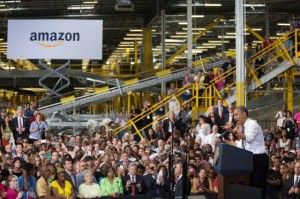
“Grand Bargain” Makes an Age-Old Jobs Argument for Competitiveness
Earlier this week in a speech in Chattanooga, Tennessee, President Barack Obama unveiled his “grand bargain” on jobs in a series of speeches on stimulating the American economy and increasing employment. While promoted as a compromise on middle class job growth, the “grand bargain” addresses two key competitiveness issues facing the United States: corporate tax policy and infrastructure.
The “grand bargain,” if implemented, would lower the corporate tax rate from 35%, currently one of the highest in the world, to 28%. To make up for the lost revenues, President Obama intends to close loopholes and eliminate special interest deductions in the current tax code.
The plan would additionally attempt to bring home some of the nearly $1.7 trillion in corporate earnings being held abroad in order to avoid double taxation. President Obama intends to accomplish this through a one-time lower tax rate for repatriation, similar to tax holiday. He did not, however, reveal what the exact rate of the tax holiday would be.
Any revenues raised from the tax reform will be pumped into a variety of projects to stimulate job growth, namely infrastructure development to improve roads, bridges, and transit systems, and job-retraining programs.
High statutory corporate tax rates and crumbling infrastructure are among the biggest contributors to America’s declining competitiveness, and threaten the state of U.S. national security.

Congressman Dave Camp, along with Sen. Max Baucus, have been advocating for comprehensive tax reform
But the “grand bargain” does not portray these issues as a matter of competitiveness. Instead, President Obama sells his plan as must for the American middle class. Appealing to the middle class is a politically safe move. But in the context of corporate tax policy and infrastructure development, will it be effective?
The White House advocates that lowering the corporate tax rate would encourage American companies to add middle-class jobs. When coupled with the elimination of tax loopholes, however, the effective tax rate (the tax rate that companies actually pay) may not decrease by enough to encourage significant job creation.
Moreover, a tax repatriation holiday may slightly raise tax revenues, but likely would not lead to increased investment in American jobs. During the last tax repatriation holiday, most money brought home went directly to dividends and share repurchases, and does not provide the economic stimulation many expect.
President Obama is correct in acknowledging the necessity for corporate tax reform, but the plan he proposes does support the job creation that the “grand bargain” proposes. As a competitiveness argument, however, corporate tax reform may be more effective. Both the right and the left would acknowledge the disadvantage that American companies face with the double taxation through the current tax code. A compelling argument for tax reform, and potentially the shift to a territorial system, can be made through addressing the impact on business. The promise of jobs has been made frequently, and may no longer carry the weight of a competitiveness argument for tax reform. President Obama’s best opportunity for a bargain may be reaching out to Democratic Senator Max Baucus and Republican Congressman Dave Camp, who have been advocating for comprehensive tax reform.
Furthermore, selling infrastructure projects as a jobs creator may not get the support necessary for the “grand bargain” to become a reality. The 2009 stimulus package that touted the “largest investment in our nation’s infrastructure since Eisenhower built an interstate highway system in the 1950’s” was a disappointment. Congress, as well as the general public, will not back another infrastructure stimulus to increase employment.
Instead, President Obama must ensure the public understands the urgency of infrastructure repair. American infrastructure received a D+ grade from the American Society of Civil Engineers, who called for an additional $3.6 trillion in investment by 2020. When included in a jobs package, however, this sense of urgency will be lost. Rather than examining the necessity of these public works projects, the focus will be the validity of the estimated job growth they will provide. If the potential employment benefits are not substantial, the infrastructure repairs may be dismissed altogether, leaving roads and bridges in desperate need of repair.
Corporate tax reform and infrastructure are two of the factors of American competitiveness that require the most immediate attention. Middle class job creation, the goal of President Obama’s new plan, is certainly not contradictory to the agenda of American competitiveness.
It just is not the best way to advertise it.
Corporate income tax reform may not create as many jobs as President Obama hopes. Talk of adding infrastructure jobs echoes an age-old promise that has previously disappointed, and is a distraction from addressing more pressing public works projects.
As a package, the “grand bargain” has a grim future. If advertised properly, however, the topics of corporate tax reform and infrastructure development might be able to gain momentum among lawmakers. If the Obama’s plan does not pass, it will be viewed as a failure for the president.
But even if it does not become law, the “grand bargain” as a package provides a glimmer of hope. Issues of American competitiveness might finally be on Washington’s agenda.








[…] “Grand Bargain” Makes an Age-Old Jobs Argument for Competitiveness Justin Winikoff Earlier this week in a speech in Chattanooga, Tennessee, President Barack Obama unveiled his “grand bargain” on jobs in a series of speeches on stimulating the American economy and increasing employment. While promoted as a compromise on middle class job growth, the “grand bargain” addresses two key competitiveness issues facing the United States: corporate tax policy and infrastructure. […]
[…] “Grand Bargain” Makes an Age-Old Jobs Argument for Competitiveness […]